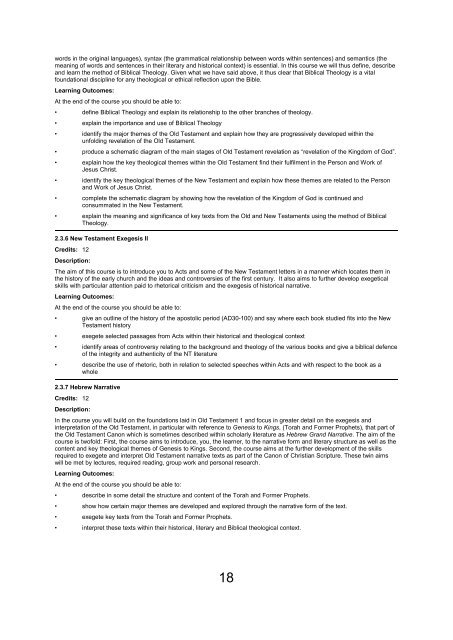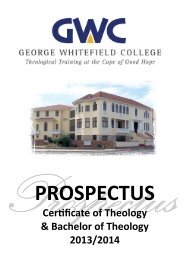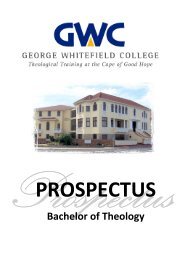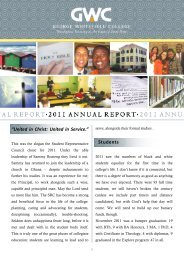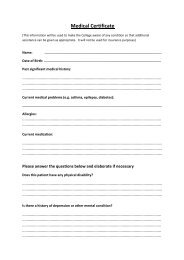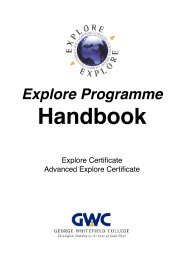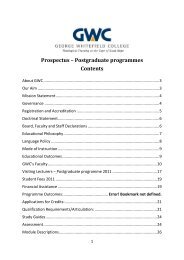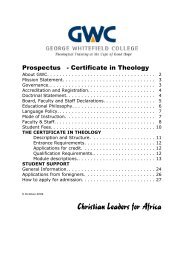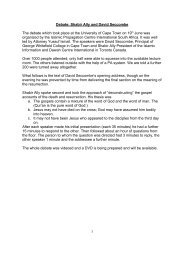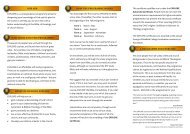Prospectus Bachelor of Theology Christian Leaders for Africa
Prospectus Bachelor of Theology Christian Leaders for Africa
Prospectus Bachelor of Theology Christian Leaders for Africa
Create successful ePaper yourself
Turn your PDF publications into a flip-book with our unique Google optimized e-Paper software.
words in the original languages), syntax (the grammatical relationship between words within sentences) and semantics (the<br />
meaning <strong>of</strong> words and sentences in their literary and historical context) is essential. In this course we will thus define, describe<br />
and learn the method <strong>of</strong> Biblical <strong>Theology</strong>. Given what we have said above, it thus clear that Biblical <strong>Theology</strong> is a vital<br />
foundational discipline <strong>for</strong> any theological or ethical reflection upon the Bible.<br />
Learning Outcomes:<br />
At the end <strong>of</strong> the course you should be able to:<br />
• define Biblical <strong>Theology</strong> and explain its relationship to the other branches <strong>of</strong> theology.<br />
• explain the importance and use <strong>of</strong> Biblical <strong>Theology</strong><br />
• identify the major themes <strong>of</strong> the Old Testament and explain how they are progressively developed within the<br />
unfolding revelation <strong>of</strong> the Old Testament.<br />
• produce a schematic diagram <strong>of</strong> the main stages <strong>of</strong> Old Testament revelation as “revelation <strong>of</strong> the Kingdom <strong>of</strong> God”.<br />
• explain how the key theological themes within the Old Testament find their fulfilment in the Person and Work <strong>of</strong><br />
Jesus Christ.<br />
• identify the key theological themes <strong>of</strong> the New Testament and explain how these themes are related to the Person<br />
and Work <strong>of</strong> Jesus Christ.<br />
• complete the schematic diagram by showing how the revelation <strong>of</strong> the Kingdom <strong>of</strong> God is continued and<br />
consummated in the New Testament.<br />
• explain the meaning and significance <strong>of</strong> key texts from the Old and New Testaments using the method <strong>of</strong> Biblical<br />
<strong>Theology</strong>.<br />
2.3.6 New Testament Exegesis II<br />
Credits: 12<br />
Description:<br />
The aim <strong>of</strong> this course is to introduce you to Acts and some <strong>of</strong> the New Testament letters in a manner which locates them in<br />
the history <strong>of</strong> the early church and the ideas and controversies <strong>of</strong> the first century. It also aims to further develop exegetical<br />
skills with particular attention paid to rhetorical criticism and the exegesis <strong>of</strong> historical narrative.<br />
Learning Outcomes:<br />
At the end <strong>of</strong> the course you should be able to:<br />
• give an outline <strong>of</strong> the history <strong>of</strong> the apostolic period (AD30-100) and say where each book studied fits into the New<br />
Testament history<br />
• exegete selected passages from Acts within their historical and theological context<br />
• identify areas <strong>of</strong> controversy relating to the background and theology <strong>of</strong> the various books and give a biblical defence<br />
<strong>of</strong> the integrity and authenticity <strong>of</strong> the NT literature<br />
• describe the use <strong>of</strong> rhetoric, both in relation to selected speeches within Acts and with respect to the book as a<br />
whole<br />
2.3.7 Hebrew Narrative<br />
Credits: 12<br />
Description:<br />
In the course you will build on the foundations laid in Old Testament 1 and focus in greater detail on the exegesis and<br />
interpretation <strong>of</strong> the Old Testament, in particular with reference to Genesis to Kings, (Torah and Former Prophets), that part <strong>of</strong><br />
the Old Testament Canon which is sometimes described within scholarly literature as Hebrew Grand Narrative. The aim <strong>of</strong> the<br />
course is tw<strong>of</strong>old: First, the course aims to introduce, you, the learner, to the narrative <strong>for</strong>m and literary structure as well as the<br />
content and key theological themes <strong>of</strong> Genesis to Kings. Second, the course aims at the further development <strong>of</strong> the skills<br />
required to exegete and interpret Old Testament narrative texts as part <strong>of</strong> the Canon <strong>of</strong> <strong>Christian</strong> Scripture. These twin aims<br />
will be met by lectures, required reading, group work and personal research.<br />
Learning Outcomes:<br />
At the end <strong>of</strong> the course you should be able to:<br />
• describe in some detail the structure and content <strong>of</strong> the Torah and Former Prophets.<br />
• show how certain major themes are developed and explored through the narrative <strong>for</strong>m <strong>of</strong> the text.<br />
• exegete key texts from the Torah and Former Prophets.<br />
• interpret these texts within their historical, literary and Biblical theological context.<br />
18


